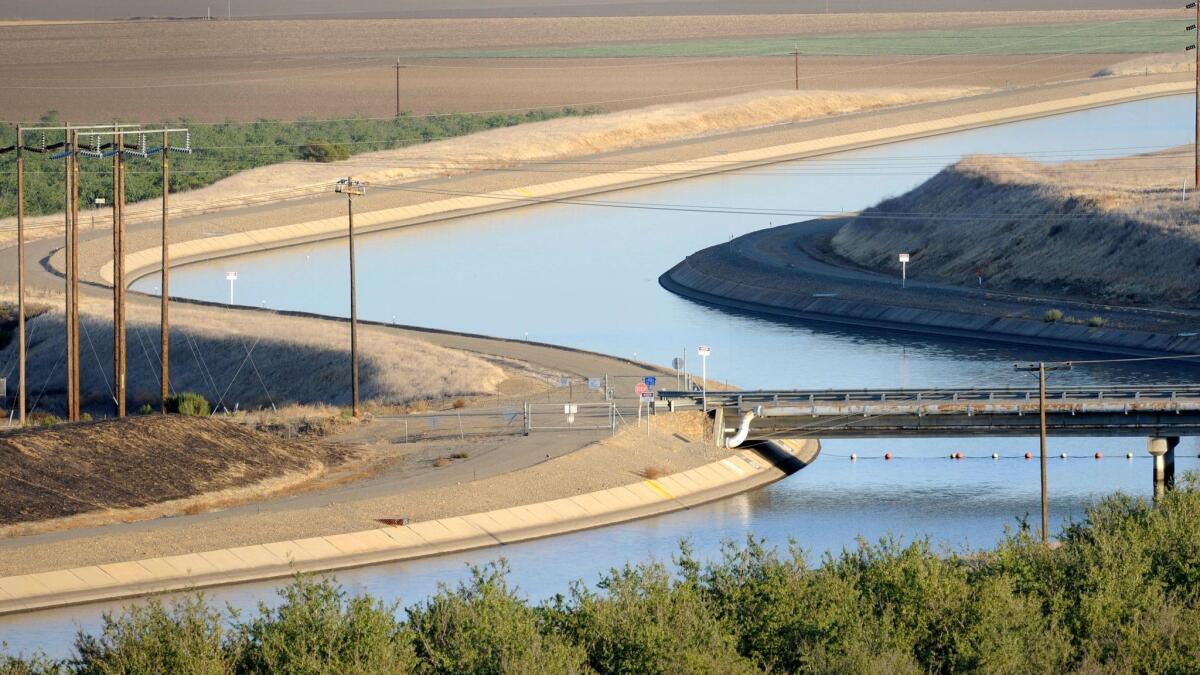Taxpayer money was wrongly used to plan California water tunnel project, federal audit says

- Share via
A federal agency left U.S. taxpayers on the hook for $50 million in water project costs that should have been paid by Central Valley irrigation districts, according to an inspector general’s report released Friday.
The audit found that the U.S. Bureau of Reclamation improperly subsidized the districts’ share of planning costs for a controversial proposal to build two massive water tunnels under the Sacramento-San Joaquin Delta.
The reclamation bureau “obtained this $50 million over a 7-year span by using a complex, obscure process that was not disclosed in the annual congressional budget justifications,” stated the report by the inspector general of the U.S. Interior Department.
“In the process,” the audit found, the reclamation bureau “also decided that the $50 million in appropriated funds was used for a non-reimbursable purpose, meaning the cost was absorbed by the federal government rather than being repaid by [Central Valley Project] water contractors.”
The reclamation bureau manages the Central Valley Project, a huge federal irrigation project that mostly supplies valley agriculture — including the sprawling Westlands Water District.
Westlands has been one of the chief backers of the tunnel project, which would re-engineer deliveries of Northern California water to San Joaquin Valley growers and Southland cities.
One of the underlying principles of the roughly $17-billion project is that the water agencies that benefit from the tunnels should pay for them, with planning costs split 50-50 between districts supplied by the State Water Project and the Central Valley Project.
But the inspector general’s office found that starting in 2009, the reclamation bureau’s regional office signed agreements with five Central Valley Project water districts that shifted a large portion of planning costs to federal taxpayers. As a result, CVP contractors contributed just 18% — compared with 47% from State Water Project districts — of the more than $250 million in planning costs through June 2016.
“We found no evidence that the [U.S. Bureau of Reclamation] subsidy was ever disclosed in annual budget justifications or financial reports, and USBR officials could not give a valid rationale for providing the subsidy,” the report stated.
Moreover, the inspector general’s office said that because the subsidy was not disclosed, Congress was unaware of the full extent of the reclamation bureau’s nearly $85-million tunnel costs.
In a response attached to the report, the reclamation bureau disagreed with the inspector general’s findings, saying the decision to assign the planning expenditures to non-reimbursable accounts was “suitable and appropriate” and made “in good faith.”
A spokesperson for the bureau’s regional office referred The Times to that document.
As the contractor with the largest potential federal share in the tunnel project, Westlands had the most to gain from the accounting arrangement.
Friday, Westlands general manager Tom Birmingham said it was the regional reclamation office that first broached the idea.
“I never heard of the [law] under which this was done until Westlands heard about” it from finance officers in reclamation’s regional office, Birmingham said.
He denied that the agreements were hidden from Congress and other participants in the tunnel project. “This was well understood,” he said.
The accounting called for the contractors to make advance payments for their normal Central Valley Project operations and maintenance costs. Reclamation then credited those advances to the contractors’ share of tunnel planning.
Birmingham also argued that even if the contractors had to repay the planning money, under federal irrigation law that would not be required until the proposed tunnel project was built.
Documents reviewed by The Times show the accounting arrangement was discussed at the end of President George W. Bush’s administration and executed during the Obama administration.
Environmentalists long have criticized the reclamation bureau for being too cozy with its irrigation district customers — particularly Westlands, which has a history of federal lobbying and hiring former reclamation officials for high-ranking district positions.
For years, the district’s chief Washington lobbyist was David Bernhardt, who served as Interior solicitor under Bush and is now back at Interior in the department’s Number 2 spot.
Although contractors supplied by the tunnels have said they will pay for construction, exactly who will pay and how much they pay remains unsettled.
“We are concerned that the absence of transparency displayed by USBR during the planning phase of the [project] will be perpetuated in the future,” the inspector general said in the report’s conclusion.
UPDATES:
4:55 p.m. This article was updated with additional details and comments from Westlands Water District.
This article was originally published at 9:50 a.m.
More to Read
Sign up for Essential California
The most important California stories and recommendations in your inbox every morning.
You may occasionally receive promotional content from the Los Angeles Times.











